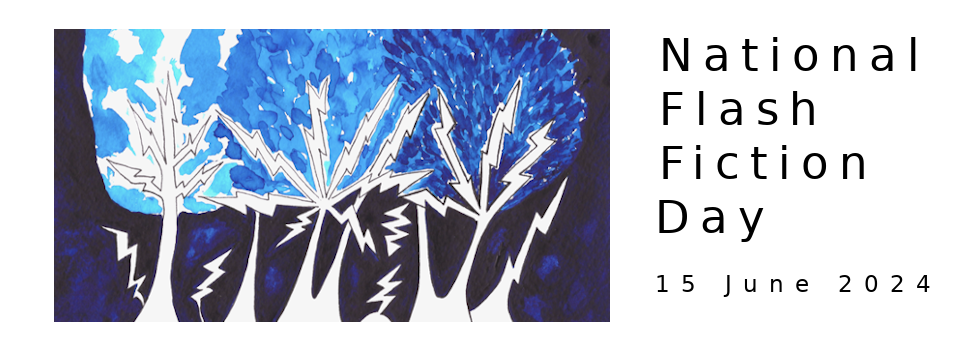Welcome to the fourth in our series of interviews with this year's National Flash Fiction Day Anthology editors and Microfiction Competition judges! Submissions for the Anthology and Microfiction Competition are open from 1 December 2021 to 15 February 2022.
This week, Diane Simmons chats with Chris Drew, one of this year's editors for the 2022 NFFD Anthology, about writing projects, creative influences, and favourite flash writers, as well as his thoughts on this year's NFFD Anthology theme....

Diane: Firstly, thank you for agreeing to be a co-editor of this year’s anthology. The theme is FREEDOM. Do you have any tips on how to interpret the theme or any advice on how to approach themes in general?
Chris: Thank you for inviting me! It’s great to be part of the NFFD team. Freedom is a fitting theme for 2022, and I’m excited to see what people come up with, but I’m hesitant to delve too deeply into an interpretation. Instead, all I’ll say is that in approaching any theme I wouldn’t worry too much about trying to be different. You hear it a lot in the literary community that you need to stand out from the crowd (the dreaded slush pile), but my advice is to forget the crowd and tell your own story. What does freedom mean to you? I’m looking forward to finding out.
Diane: Are there any flash fictions that you remember made you laugh out loud? If not, are there any that have made you cry?
Chris: There are flashes that come along once in a while that for some unfathomable reason stay with you. Something in them – a phrase or an image or perhaps the rhythm – can sink onto your subconscious and surface over and over again. Anybody who reads Sharon Telfer’s My Father Comforts Me in the Form of Birds, or Helen Rye’s One in Twenty-Three, can’t help but be affected by them. Why? Because there’s so much emotion in there presented in a way that isn’t overly sentimental. It’s a delicate balance, but if done right, if the words are chosen carefully, plainly, the reader is able to make an emotional connection to the story independently, from their own experiences, and make it their own. As for humour, there isn’t enough of it in flash fiction, probably because it’s incredibly difficult to get right. Tim Craig is a master at this, so too is Elisabeth Ingram Wallace. It’s a natural-born style. You either have it or you don’t.
Diane: Do you have any writing projects on the go?
Chris: Too many. I have a novella-in-flash that’s currently out on submission, and the beginnings of a flash fiction collection simmering in the background. Recently, I’ve been working on the second draft of a Middle Grade novel that I started writing for my kids a few years ago, so I’d best finish it before they’re too old to care. I also have the first draft of a psychological thriller that I want to rewrite at some point, and a few other novel ideas floating around that have hit the 10 or 20k mark. I tend to work on a few projects simultaneously rather than having a single focus. Whether that’s a good or bad thing I’m not sure. The key, I think, is to just keep writing, day after day after day.
Diane: You were a founding editor of the historical online journal FlashBack Fiction. You obviously enjoy reading historical fiction and I wondered if you write much of it yourself? If so, do you have a favourite time period in history?
Chris: I was in the right place at the right time when the concept of FlashBack Fiction was discussed in a random Twitter thread a few years ago. When Ingrid took the reins and I had the opportunity to work with Emily Devane and Damhnait Monaghan, Judi Walsh and Sharon Telfer (and, briefly, K.B. Carle) I leapt onto the bandwagon. The year I spent as editor there was invaluable to me as a writer, not only in approaching flash fiction from a different angle (as a critical reader), but also to watch the other editors work, their flow of discussion, their insights, and, occasionally, fisticuffs*. I don’t have a favourite period per se; I’m more interested in character. Whether it’s a soldier hunting buffalo and facing his PTSD in Gutshot, fruit pickers helping the war effort in Plum Jam, or a slave trapped in the surreal space between love and mercy in Tyn. I remember each of these stories, not for the historical setting, but for the characters. One of the most remarkable feats of flash fiction is that you can create a living, breathing human being in only a few hundred words.
*No editors were harmed in the discussion of these stories.
Diane: Is there a flash fiction writer who has influenced your own writing? Or one who you particularly admire?
Chris: Goodness, yes. I admire Gaynor Jones for her determination and talent, Stephanie Carty for her courage and compassion, Elisabeth Ingram Wallace for her originality, Eileen Merriman for her general super-human-ness, Victoria Richards for her honesty and diversity of form, and Christina Dalcher and Charmaine Wilkerson for showing us all that dreams do come true. There are others. In terms of influencing, Peter Jordan has that clean, stripped prose that I strive to emulate. He’s helped me a lot in my writing over the years, directly and indirectly, and I always return to his stories for inspiration.
Christopher M Drew is a writer from Yorkshire. He started submitting flash fiction in 2015 and since then has been published widely in online journals and print anthologies. He has won second prize in the Bath Flash Fiction (2016), Reflex Fiction (2018), and Forge Literary Flash Fiction (2019) competitions. His SmokeLong Quarterly story Alligator was selected for Best British and Irish Flash Fiction 2019, and When we were young, originally published in trampset, was selected for Best Microfiction 2021. He has been nominated for Best Small Fictions and Best of the Net, and was one of the founding editors of the historical flash fiction journal FlashBack Fiction. You can connect with Chris on Twitter (@cmdrew81), or through his website (https://chrisdrew81.wixsite.
